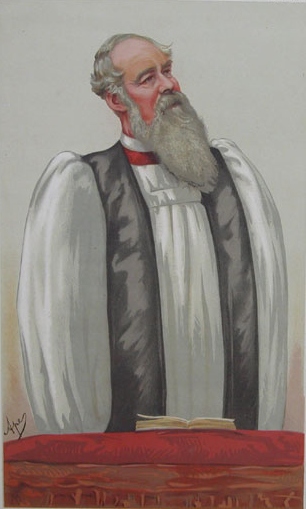Santidad
Frases célebres de J.C. Ryle
Santidad
Cristo es el todo
Santidad
Frases de hombres de J.C. Ryle
Santidad
Santidad
Santidad
Frases sobre el corazón de J.C. Ryle
Santidad
Samuel Rutherford (1600-1661), Trial of Faith
Santidad
Santidad
Pensamientos para hombres jóvenes
¿Vivo o muerto?
J.C. Ryle Frases y Citas
Cristo es el todo
J.C. Ryle: Frases en inglés
“Do something, by God's help, to make heaven more full and hell more empty.”
Fuente: Old Paths (1878), Ch. II: "Our Souls", p. 62
“The Bible in the pulpit must never supersede the Bible at home.”
Fuente: Holiness: Its Nature, Hindrances, Difficulties, and Roots (1877), Ch. 19: "Wants of the Times", p. 381
“[T]he devil has more knowledge than any of us, and yet is no better for it.”
Vol. III, John XV: 22–27, p. 123
Expository Thoughts on the Gospels: St. John (1865–1873)
“Ignorance of Scripture is the root of every error in religion, and the source of every heresy.”
Vol. I, Preface, p. xiii
Expository Thoughts on the Gospels: St. John (1865–1873)
Fuente: Home Truths (1859), Ch. II: "Repent, or Perish", p. 73
“The love of Christ towards His people is a deep well which has no bottom.”
Expository Thoughts on the Gospels: St. Luke (1858–1859), Vol. II, Luke XXII: 54–62, p. 438
“The heart that has really tasted the grace of Christ, will instinctively hate sin.”
Vol. II, Luke XIX: 1–10, p. 294
Expository Thoughts on the Gospels: St. Luke (1858–1859)
“We are all naturally self-righteous. It is the family-disease of all the children of Adam.”
Vol. II, Luke XVIII: 9–14, p. 259
Expository Thoughts on the Gospels: St. Luke (1858–1859)
“Wealth is no mark of God's favour. Poverty is no mark of God's displeasure.”
Vol. II, Luke XVI: 19–31, p. 212
Expository Thoughts on the Gospels: St. Luke (1858–1859)
“Nothing is so offensive to Christ as lukewarmness in religion.”
Vol. II, Luke XI: 21–26, p. 25
Expository Thoughts on the Gospels: St. Luke (1858–1859)
“The highest form of selfishness is that of the man who is content to go to heaven alone.”
Vol. I, Luke VIII: 16–21, p. 257
Expository Thoughts on the Gospels: St. Luke (1858–1859)
Vol. I, Luke VII: 31–35, p. 230
Expository Thoughts on the Gospels: St. Luke (1858–1859)
“A converted man will not wish to go to heaven alone.”
Vol. I, Luke V: 27–32, p. 150
Expository Thoughts on the Gospels: St. Luke (1858–1859)
“However corrupt our hearts, and however wicked our past lives, there is hope for us in the Gospel.”
Vol. I, Luke V: 12–16, p. 137
Expository Thoughts on the Gospels: St. Luke (1858–1859)
“Jesus hears us, and in His own good time will give an answer.”
Matthew XV: 21–28, p. 182
Expository Thoughts on the Gospels: St. Matthew (1856)
“It is neglect of the Bible which makes so many a prey to the first false teacher whom they hear.”
Matthew VII: 12–20, pp. 68–69
Expository Thoughts on the Gospels: St. Matthew (1856)
Matthew IV: 1–11, p. 26
Expository Thoughts on the Gospels: St. Matthew (1856)
“Take away the cross of Christ, and the Bible is a dark book.”
"What Think You of the Cross?", p. 276
Startling Questions (1853)
Fuente: A Call to Prayer (1867), p. 35
Fuente: Knots Untied (1877), Ch. XVII: "The Fallibility of Ministers", p. 383
Fuente: Home Truths (1859), Ch. II: "Do You Want a Friend?", p. 21
Fuente: Knots Untied (1877), Ch. XII: "Confession", p. 261
“Where no visible fruit can be found, there you may be sure is no conversion.”
Fuente: Old Paths (1878), Ch. XII: "Conversion", p. 335
Fuente: Old Paths (1878), Ch. V: "Alive or Dead", p. 145
Vol. III, John XIV: 4–11, p. 60
Expository Thoughts on the Gospels: St. John (1865–1873)
“[T]here is more to be learned at the foot of the cross than anywhere else in the world.”
"What Think You of the Cross?", p. 284
Startling Questions (1853)
“Never let us be guilty of sacrificing any portion of truth upon the altar of peace.”
Fuente: Knots Untied (1877), Ch. XVII: "The Fallibility of Ministers", p. 373
Fuente: The Upper Room (1888), Ch. XVI: "The Duties of Parents"
